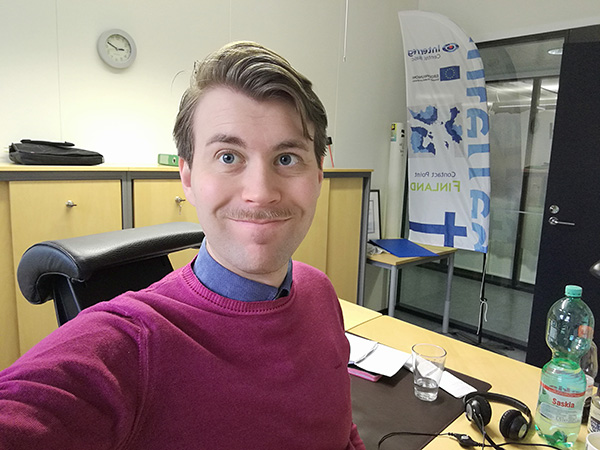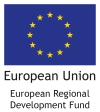This is the second instalment of a this mini-series, where we introduce our national Contact Points from around the programme area. The national Contact Points are the link between the programme and the regions. They inform about the funding opportunities and provide first information for potential applicants. Contact Points also help with partner search and matchmaking. In addition, they follow projects closely to share/spread project results and communicate the benefits of cross-border cooperation.
Part 1: Our national Contact Point on Åland - Ester Laurell
Part 2: Our national Contact Point in Latvia - Ilze Lezgdina
 Jaakko Ranta
Jaakko Ranta
(2018)
I have worked as a National Contact Point for Finland since June 2017. I am based in Helsinki with my host organisation Helsinki-Uusimaa Regional Council.
How did you end up working with Central Baltic?
I was already working at Helsinki-Uusimaa Regional Council and when my predeccesor left her post as a national Contact Point, I was asked to jump in her place. International team and cross-border working seemed interesting to me, so I applied and got the post.
What does a typical working day look like?
I try to attend as many events organises by projects as I can. I also regularly interview project persons for communication purposes to learn about their results and the change they initiate in the programme area. Also traveling to team meetings and programme events around the region presenting the programme itakes up a lot of time.
When I am at the office I am writing stories of the above mentioned events and meetings, so basically doing communications. I follow projects closely in social and traditional media, do regular reporting as is required in all EU-related work, and I also get regular contacts from people looking tips or instructions to EU financing.
I also think it is important to understand matters in a wider context so I try to follow EU, international and domestic politics whenever time allows.
What are you currently working with?
I have a long-term project with repairing an old Italian road cycle from the 1980s to a tip-top shape. It is possible to spend countless hours on obscure Italian sites trying to figure out what old bicycle parts they are actually selling.
But if you are asking about work-related matters, I am currently working on project stories, which will be published in Central Baltic Communications. I have interviewed and will interview projects in Finland and work stories from these trying to show the results achieved with EU funding in the region.
What is the best thing about your work?
Best part is to travel around the Baltic Sea region with boats, planes and airplanes and meet wonderful, dedicated hard-working people working with EU projects. This has really changed my perception of EU funding instruments, when I have met and seen the people working behind the grey facade of institutions and official procedures and instructions. I am also very interested in developing communication methods of European institutions to become more open and interesting and at the same time remember that we don’t have to lower ourselves to clickbait tactics of content creation farms.
Part 1: Our national Contact Point on Åland - Ester Laurell
Part 2: Our national Contact Point in Latvia - Ilze Lezgdina
 Jaakko Ranta
Jaakko Ranta(2018)
I have worked as a National Contact Point for Finland since June 2017. I am based in Helsinki with my host organisation Helsinki-Uusimaa Regional Council.
How did you end up working with Central Baltic?
I was already working at Helsinki-Uusimaa Regional Council and when my predeccesor left her post as a national Contact Point, I was asked to jump in her place. International team and cross-border working seemed interesting to me, so I applied and got the post.
What does a typical working day look like?
I try to attend as many events organises by projects as I can. I also regularly interview project persons for communication purposes to learn about their results and the change they initiate in the programme area. Also traveling to team meetings and programme events around the region presenting the programme itakes up a lot of time.
When I am at the office I am writing stories of the above mentioned events and meetings, so basically doing communications. I follow projects closely in social and traditional media, do regular reporting as is required in all EU-related work, and I also get regular contacts from people looking tips or instructions to EU financing.
I also think it is important to understand matters in a wider context so I try to follow EU, international and domestic politics whenever time allows.
What are you currently working with?
I have a long-term project with repairing an old Italian road cycle from the 1980s to a tip-top shape. It is possible to spend countless hours on obscure Italian sites trying to figure out what old bicycle parts they are actually selling.
But if you are asking about work-related matters, I am currently working on project stories, which will be published in Central Baltic Communications. I have interviewed and will interview projects in Finland and work stories from these trying to show the results achieved with EU funding in the region.
What is the best thing about your work?
Best part is to travel around the Baltic Sea region with boats, planes and airplanes and meet wonderful, dedicated hard-working people working with EU projects. This has really changed my perception of EU funding instruments, when I have met and seen the people working behind the grey facade of institutions and official procedures and instructions. I am also very interested in developing communication methods of European institutions to become more open and interesting and at the same time remember that we don’t have to lower ourselves to clickbait tactics of content creation farms.


